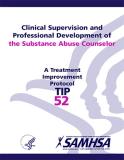
Clinical supervisors play an important role throughout the workforce acting simultaneously as a teacher, mentor, coach, and consultant, working to enhance the skills, knowledge, and expertise for those they supervise.
In addition to these skill development roles, clinical supervisors often find that they are responsible for the administrative oversight and responsibilities of a traditional manager. While challenging, this role can be quite rewarding and is key to the improvement and successful implementation of evidence-based practices.
In general, quality supervision practices:
Just like the skills learned and subsequently imparted to a supervisee, clinical supervision is a skill that requires development to support the capacity of new and experienced supervisors. This skillset requires flexibility and a range of ability to adapt to the specific needs of supervisees who are at varying stages of their career development. Ultimately quality supervision can support retention, morale, culturally appropriate service delivery, EBP adherence, and overall quality care improvements (SAMHSA, TIP 52).

Recommended Resource:
The NWATTC offers several different trainings on Clinical Supervision:
This workshop will provide a broad overview of clinical supervision for those who have not had formal training in this area. It's also a helpful refresher for those who have been practicing as supervisors and want reinforcement of clinical supervision models. The goal of the first level of clinical supervision (CS1) is to help providers understand the research supporting effective supervision methods, identify the roles in the supervisory relationship, increase awareness of cultural considerations in applying a framework of cultural humility to supervision, practice skills that structure clinical supervision (e.g., Feedback Model, Professional Development Plan, Supervisory Interview), and gain familiarity with available resources for clinical supervision.
The second phase of the training in clinical supervision for behavioral health providers focuses on dilemmas clinical supervisors face and how to put into practice the CS skills learned in phase one. CS2 is designed to further increase supervisors’ understanding and skill in assessing counselors in mental health and substance use disorder treatment settings. This training emphasizes how to handle problems that may arise in the supervision process. It also emphasizes the importance of creating structure, collaborative teaching and mentoring, and builds on skills in risk management and setting boundaries as a supervisor.
This training was created for supervisors, clinicians, administrators, and others who are at any stage of integrating peer support into their organization's recovery support services. Due to the unique nature of peer professionals compared to others working around them, there's a need to ensure clear communication, expectations, and procedures to avoid role drift outside of best practices that allow peer professionals to provide care that is both in scope and aligned with professional guidelines.
This six-month long full immersion program in clinical supervision is intended to introduce participants to a model of supervision, familiarize them with competency-based counselor skill development, prepare them to be highly qualified clinical supervisors, and meet state guidelines for being an approved supervisor in the four states in region 10. The curriculum includes live experiential training sessions and on-going learning session opportunities, culminating in direct observation combined with individual coaching in specific supervision skills. This program, when fully completed, will provide participants with 30 NAADAC CE hours, which meets Alaska, Idaho, Oregon and Washington training requirements to be recognized as a Clinical Supervisor. All the training material have been customized to meet the cultural and clinical needs of Tribal Clinical Supervisors.
This workshop aims to examine the role supervisors may have from an ethical perspective to become a preventionist for their supervisees and ultimately the community members they serve by exploring practical strategies for identifying supervisee blind spots or growth areas, as well as key factors that may support a supervisor’s ability to foresee and prevent their own ethical missteps. Additionally, those who participate in this learning opportunity explore how these strategies and skills can aid them in their efforts to engage supervisees in their own professional development and self-care.
